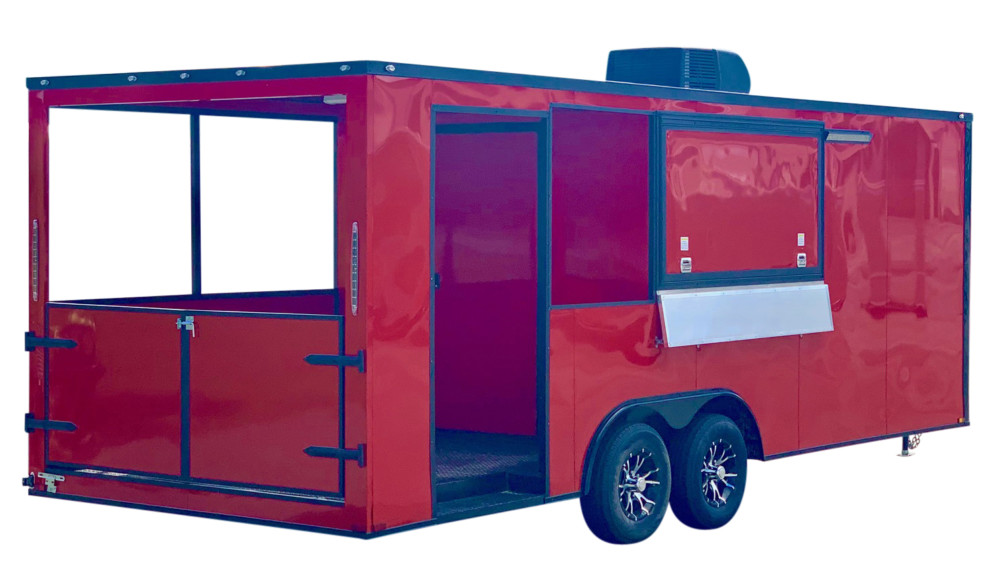
In this corner we have food trucks, born as brick and mortar restaurants became more expensive to run and operate and entrepreneurial chefs took their creations wherever the hungry masses gathered. In the opposite corner, we have food trailers. By being towable, food trailers offer even greater customization in where, when, and how food operations can be deployed.
In today’s enclosed trailer deep dive, we’ll be comparing the benefits of food trucks vs food trailers and weighing the costs to see which of these portable pantries reigns supreme.
What Defines a Food Truck?
Food trucks are typically a large boxy delivery-type van that has been converted into a mobile kitchen. The Ford Step Van model is a popular choice for UPS trucks and down the line as food trucks by many food truck owners. But buying a secondhand delivery van is risky business. Acting as delivery trucks in their past lives means they can have a lot of miles and years on their engine and parts.
Now, conventional food trucks do offer a large, mobile kitchen that can be parked and the driver walks right back into the kitchen and gets to work. That spells a quick set-up for mobile cooking. Food trucks, therefore, can be defined as a kitchen that can move from place to place under its own power. However, food trucks can be as small as Tuk Tuks outfitted to be a mobile Chai stand in San Francisco to extra long Ford Step Vans furnished with a full commercial kitchen. If the place of cooking/preparation can transport itself to your desired location, you’ve got yourself a food truck.
What is a Food Truck Trailer?
The other side of the debate is the food trailer, concession trailer, food truck trailer, or any one of a dozen other ways to refer to a towable kitchen-on-wheels. A concession trailer is towed to its destination by a tow vehicle and then usually requires some set-up on site before you can begin operations. Once the tow vehicle is parked, it’s a good idea to employ stabilizers to eliminate swaying as you busily walk around the kitchen fulfilling orders.
For the sake of our comparison, we’ll define a food truck trailer as an enclosed or semi-enclosed trailer that relies on a tow vehicle in order to be placed in the perfect location.
How Food Trucks and Food Truck Trailers Are Similar
Although food trucks and food trailers are coming at the same opportunity from different angles, there is a lot they still have in common. These commonalities help define what mobile food ordering can look like and have opened up the doors of culinary delights far beyond geographical limitations.
A few similarities between food trucks and trailers to consider include:
- Cheaper Start-Up Costs: Mobile food units, both trucks and trailers, are known for requiring less capital in order to get started than a brick and mortar restaurant. You aren’t having to go out and buy a commercial property and renovate it to make it into a successful venture, nor are you hiring a large staff to keep up with all the demands inherent to the restaurant business.
That’s why a lot of chefs have fallen onto food trucks and food trailers as a way to focus more on what they’re actually passionate about instead of a more complex operation. This has sparked a “purist” movement of sorts, to move back to your roots as a chef and be less chained to the confines of your physical surroundings. Mobility stands as the biggest similarly defining characteristics of both food truck trailers and food trucks themselves.
- Power Needs: Both food trucks and food truck trailers will usually require on-site power which for most operations means a generator. Generators can be loud and put off fumes so consideration needs to be given to the type and location of the generator relative to the trailer or truck. Smart owners get quiet generators that can run a distance away from their kitchen so employees and guests aren’t gassed out by fumes.
- Mobile Advertising Units: Another similarity is that both food trucks and trailers provide a large advertising space on the side of the unit. Advertise your restaurant, coffee shop, mobile bar, or catering business with as much style and flair as you want to turn heads and get noticed.
Whether you are considering a food truck or a food trailer really all boils down to your business plan. If you haven’t already gone through the process of creating one, a business plan is what’s going to help anticipate the costs, the foot traffic, breakeven, advertising, and other aspects of running your own mobile restaurant empire. Sitting down and going through the numbers will give you a far better appreciation for where one unit can give you an edge over the other.
Benefits of Food and Concessions Trailers
Okay, so we know that food trucks and food trailers offer a great way to get your grub on the go, but which is better for launching your nomadic culinary wares? Let’s take a closer look at the benefits of going with a food trailer that gets people excited about the gastro experience only your cuisine can deliver.
Customization
When you purchase a food trailer from Renown, you have an almost limitless amount of customization options based on all the different types of trailers available. You can black out a 7 x 16 trailer and add extra large serving windows for your brand of BBQ or make a 6 x 12 tandem axle the perfect mobile snow cone shop (trust us, we’ve helped past clients launch highly successful ones!). The point is, there are not many food truck trailer dealers out there so you’ll be left having to piece together these different elements yourself or can spend a small fortune at a custom shop.
For ease of incorporating whatever customizations are desired, food trailers run supreme in our head-to-head comparison. From beefed up electrical and lighting to thicker skin to improve aesthetics and the protection level for all your equipment, you can outfit your food truck trailer exactly how you want it down to the individual screw.
Different Sizes
One of the most noticeable differences with food trailers is the sheer amount of selection you have of brand new, never used enclosed trailers in so many different sizes. Browsing used box trucks to make into a food truck and you are trying to fit your operations inside of someone else’s box. Conversely, with food trailers you get to find the perfect fit to meet your needs so you can get exactly as much as you need but don’t have to get more than that. This also presents an economical benefit by having the possibility of opting for a smaller size trailer when that’s what will work.
Transportability
True, a food truck can get to its destination under its own power, but a food trailer is actually easier to transport and here’s why. If you go to an event with a food trailer, you can drop the trailer wherever it needs to go and then still retain your tow vehicle for whatever you need it for. Park the branded tow vehicle in a different location than the trailer for twice the amount of brand activation; leave your trailer to make a quick errand; or even drop the food trailer overnight if it’s a multi-day event. Having more options simply makes your life as a food truck trailer operator that much easier.
Cost
Okay, down to the brass tax. Arguably the most sought after reason to go with a food truck trailer over a food truck comes down to cost. You can deck out a brand new trailer with all of the bells and whistles, have it financed, and delivered, and you’ll most likely still come out way under what getting a food truck retrofitted and ready to run will cost.
In fact, according to a recent CNBC article, the total first-year costs for starting a food truck runs around $100,000 on average! While that’s far less than buying a physical piece of property and building out your own restaurant, that’s still a large threshold to consider when weighing whether a food truck or food trailer is right for your operations.
Outside of the initial cost is the cost of ownership. With a food truck, you’ll need to do everything required to keep a vehicle running. If it’s an older, used food truck, you may have a lot of different maintenance issues that will need to be addressed. While you do have ongoing maintenance with a food truck trailer, there’s no engine and minimal parts so the costs to maintain will be far less.
Ordering Your Own Custom Food Truck Trailer
Want to talk over what you have in mind with a trailer expert? Renown’s team is standing by to get you in the perfect food trailer to launch a successful venture. Contact us now to get started.
